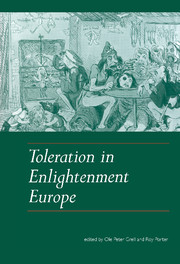Book contents
- Frontmatter
- Contents
- List of contributors
- Preface
- 1 Toleration in Enlightenment Europe
- 2 Toleration and the Enlightenment Movement
- 3 Multiculturalism and Ethnic Cleansing in the Enlightenment
- 4 Intolerance, the Virtue of Princes and Radicals
- 5 Spinoza, Locke and the Enlightenment Battle for Toleration
- 6 Toleration and Enlightenment in the Dutch Republic
- 7 Toleration and Citizenship in Enlightenment England: John Toland and the Naturalization of the Jews, 1714–1753
- 8 Citizenship and Religious Toleration in France
- 9 A Tolerant Society? Religious Toleration in the Holy Roman Empire, 1648–1806
- 10 Enlightenment in the Habsburg Monarchy: History of a Belated and Short-Lived Phenomenon
- 11 Toleration in Eastern Europe: the Dissident Question in Eighteenth-Century Poland–Lithuania
- 12 Toleration in Enlightenment Italy
- 13 Inquisition, Tolerance and Liberty in Eighteenth-Century Spain
- Index
2 - Toleration and the Enlightenment Movement
Published online by Cambridge University Press: 03 February 2010
- Frontmatter
- Contents
- List of contributors
- Preface
- 1 Toleration in Enlightenment Europe
- 2 Toleration and the Enlightenment Movement
- 3 Multiculturalism and Ethnic Cleansing in the Enlightenment
- 4 Intolerance, the Virtue of Princes and Radicals
- 5 Spinoza, Locke and the Enlightenment Battle for Toleration
- 6 Toleration and Enlightenment in the Dutch Republic
- 7 Toleration and Citizenship in Enlightenment England: John Toland and the Naturalization of the Jews, 1714–1753
- 8 Citizenship and Religious Toleration in France
- 9 A Tolerant Society? Religious Toleration in the Holy Roman Empire, 1648–1806
- 10 Enlightenment in the Habsburg Monarchy: History of a Belated and Short-Lived Phenomenon
- 11 Toleration in Eastern Europe: the Dissident Question in Eighteenth-Century Poland–Lithuania
- 12 Toleration in Enlightenment Italy
- 13 Inquisition, Tolerance and Liberty in Eighteenth-Century Spain
- Index
Summary
It has become increasingly difficult to write about the Enlightenment. The topic has been the subject of great academic interest over the last half century. Although it was accepted that the general features of the Enlightenment were well known, it was felt that there was still a great deal to learn about the variety of its manifestations. Interest was also stimulated by the attempt to understand the way in which the progressive hopes associated with the Enlightenment, not least the desire to create more tolerant societies, foundered so badly in the first half of the twentieth century. The consequence of much energetic research has been to dissolve old certainties, to find Enlightenment in the most unlikely places, to see national characteristics in the Enlightenment, and to make one wonder whether the Enlightenment was a movement at all. In 1987, J.G.A. Pocock, speaking at the Seventh International Congress on the Enlightenment at Budapest, suggested that one should not use the definite article – The Enlightenment – because ‘it creates the [inaccurate] presumption of a single unitary process, displaying a uniform set of characteristics’. His view was cited by L.G. Crocker in his introduction to The Blackwell Companion to the Enlightenment. He also followed Norman Hampson in arguing that although the use of the word Enlightenment is justified, it cannot be defined satisfactorily:
All [definitions] fail because the complexities and inconsistencies of historical reality overflow the rationally convenient reduction to a definition, which is by definition, a limit … To use a definition, as Hegel said, immediately exposes what contradicts it. The penalty is historical distortion.
- Type
- Chapter
- Information
- Toleration in Enlightenment Europe , pp. 23 - 68Publisher: Cambridge University PressPrint publication year: 1999
- 1
- Cited by

